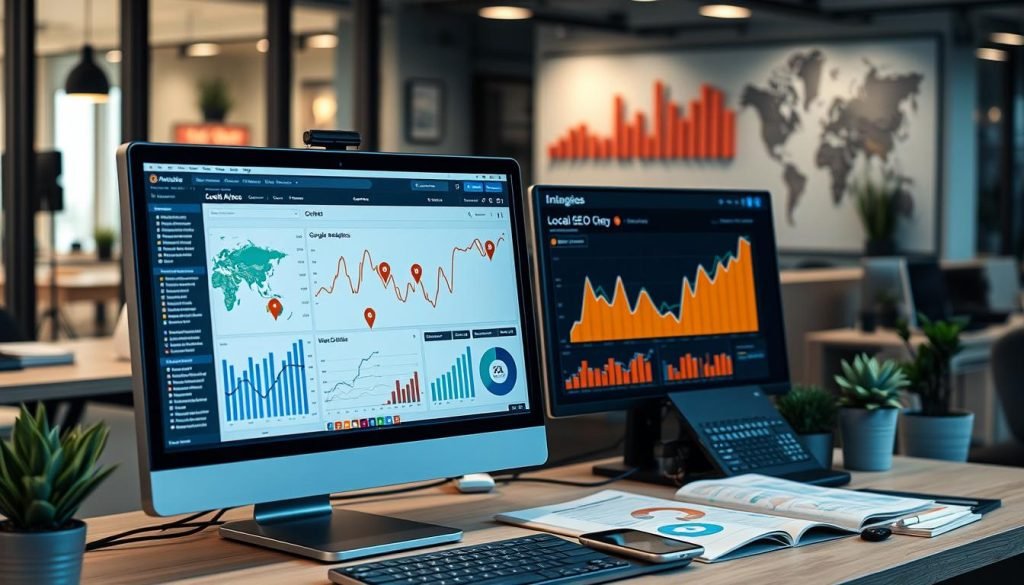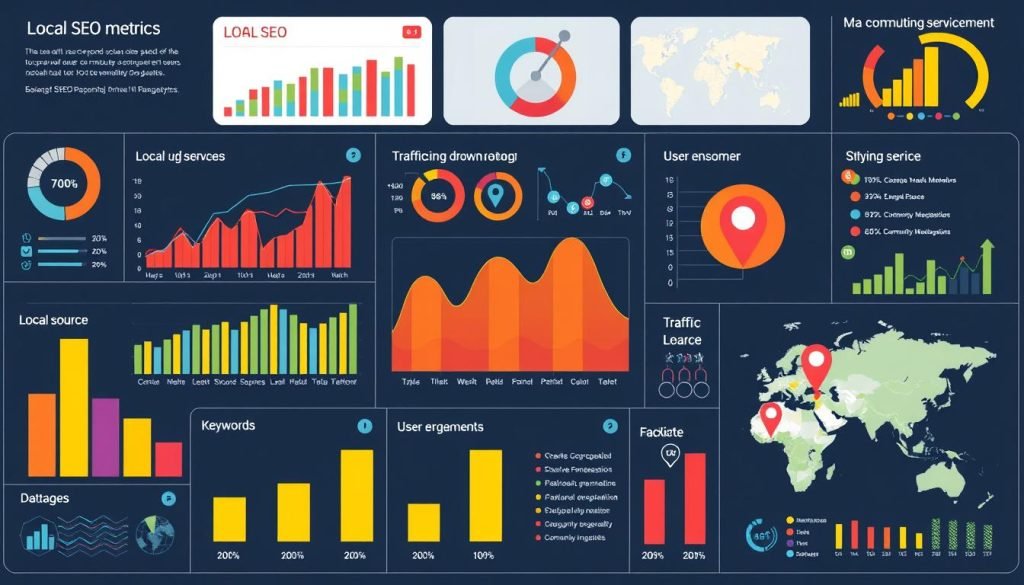Did you know 46% of all Google searches are for local info? With local search growing, businesses focus on strong local SEO. But, it’s key to track and report success to improve and get results.
This article will guide you on the best ways to report and track local SEO. You’ll learn to find chances, measure success, and make smart choices. These will help boost your visibility and draw in more local customers.
Key Takeaways
- Local and mobile search are closely intertwined, with 61% of all Google searches performed on mobile devices.
- Detailed insights into local SEO performance are essential for businesses relying heavily on local customers, such as restaurants, retail stores, and service providers.
- Local SEO reports should include a comprehensive analysis of key metrics, including local search engine rankings, Google My Business insights, website performance, and competitor analysis.
- Segmenting keywords and traffic by location and device is crucial for understanding visibility and user behavior within specific geographic areas.
- Regularly monitoring local search engine results pages (SERPs) and updating local SEO practices ensures a business remains competitive within its local market.
Establishing Effective Rank Tracking for Local SEO
Proper rank tracking is key for a successful local SEO strategy. Start by setting up geo-grid rank tracking with tools like Local Falcon or Places Scout. These tools help you see how your local business ranks in your area.
Curating a Targeted Keyword List
When making your keyword list, mix short-tail, long-tail, explicit, and implicit terms. This captures all the ways people might search for what you offer. Also, remember that Google now looks at business hours when ranking, so pick your keywords wisely.
Adjusting Tracking Grid Size
The size of your rank tracking grid matters a lot. A grid that’s too big might miss important details, while a small one won’t give enough insights. Adjust it to fit your business needs, watching how competitors do in areas like reviews and keywords.
Utilizing Ranking Data for Strategy Optimization
Once your tracking is set up and your keywords are chosen, use the data to improve your SEO. Look at your Share of Local Voice (SoLV) scores to see how you rank in local searches. Use this to focus on organic search, create service area pages, and tweak your content and links.
Good local rank tracking keeps you ahead of competitors and makes sure the right people find you. By following these tips, you’ll boost your local search performance.
“Accurate local rank tracking is the lifeblood of any effective local SEO strategy. It’s the only way to truly understand how your business is performing in the hyper-competitive world of local search.”
Best Practices for Local SEO Reporting and Tracking
Tracking your local SEO efforts is key to knowing if they’re working. By using the right tools and analyzing data, you can learn how to improve. This helps your business grow and succeed.
Configuring Google Analytics 4 for Accurate Data Tracking
Google Analytics 4 (GA4) offers deep insights into your local SEO. To track data well, set up GA4 correctly. This means adjusting settings and adding custom dimensions and events that match your SEO goals.
Implementing Call Tracking for Quality Lead Analysis
Just looking at “click to call” metrics isn’t enough. Call tracking tools like CallRail help you see if leads are good. They show if calls come from your Google Business Profile or organic search.
Attributing Conversions Across Platforms
To really see how your local SEO works, track conversions on your website, Google Business Profile, and more. A good attribution model gives you a full picture. This helps you make better choices for your SEO strategy.
Focusing on Year-over-Year Trends
When looking at your SEO data, focus on trends over time, not just month-to-month. This is especially true for seasonal businesses. It gives a clearer view of your SEO’s real impact, helping you make smarter decisions.
By following these best practices, you can get the insights you need to improve your local SEO. Remember, keeping an eye on your efforts and making adjustments is crucial for lasting success.

Conclusion
Following best practices for local SEO is key for businesses to grow online. They need to track their rank, collect data right, and look at trends over time. Ma Consulting Services helps businesses reach their local SEO goals with our detailed services and knowledge.
Keeping an eye on local SEO metrics like organic traffic and Google My Business performance is important. Using special local SEO tools and optimizing your Google My Business profile can also help. Regular audits and strategy changes based on data will keep you competitive in local search.
To find out how Ma Consulting Services can help with your local SEO, call us at +1 (951) 271-8256 or visit www.maconsultingservices.site. Our team of experts is ready to help you succeed and boost your online presence in your area.
FAQ
What are the best practices for local SEO reporting and tracking?
Measuring and reporting on local SEO success is key. Start by setting up rank tracking and using Google Analytics 4. Also, track calls and look at year-over-year trends. This helps you make better decisions and improve your strategy.
How can I set up geo-grid rank tracking for local SEO?
To track local ranks, use tools like Local Falcon or Places Scout. They have geo-grid maps. Use various keywords and adjust the grid size for your business. This helps analyze your ranking performance accurately.
What are the best practices for configuring Google Analytics 4 for local SEO?
Configuring Google Analytics 4 (GA4) is vital for tracking website conversions. Adjust settings for proper data collection. Also, use call tracking and “click to call” metrics. This gives insights into lead quality from your local SEO efforts.
How can I attribute conversions across different platforms for local SEO?
Use CallRail for call tracking. It helps attribute onsite calls from Google Business Profile clicks. This shows how well your local SEO is working.
Why is it important to focus on year-over-year trends for local SEO reporting?
Year-over-year trends are crucial. Monthly changes can be misleading, especially for seasonal businesses. Analyzing long-term trends helps make informed decisions and grow your local SEO strategy.
Source Links
- https://blog.hubspot.com/marketing/local-seo
- https://cmlabs.co/en-us/seo-guidelines/local-seo-reporting
- https://searchengineland.com/?p=437091
- https://keyword.com/blog/how-to-monitor-and-track-local-seo-results/
- https://backlinko.com/local-seo-guide
- https://inmoment.com/blog/local-seo/
- https://www.semrush.com/blog/what-is-local-seo/
- https://biziq.com/local-seo/
- https://heytony.ca/top-tips-for-local-seo-reporting/
- https://medium.com/@Shahriare/tracking-and-measuring-local-seo-performance-ca842a0ff959



